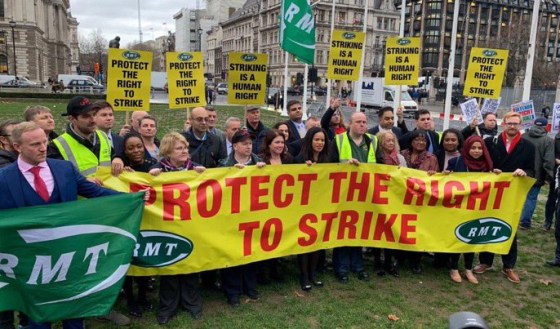SNAP LEGISLATIVE ELECTIONS WERE HELD ON 12.12.19 DUE TO THE PARALYSIS OF THE CONSERVATIVE PARLIAMENT AROUND THE BREXIT QUESTION. With 365 seats, the Conservatives of Boris Johnson are now strongly ahead of the Labour Party (then led by Jeremy Corbyn) which got only 203 seats. This is in terms of seats. An analysis in terms of votes, shows that the slide of Labour votes towards the Conservatives is much less than reported.
The short electoral campaign soon became the arena for the trial of Jeremy Corbyn: He was not patriotic enough; he hovered too much between Brexit and Remain and his party was institutionally anti-Semitic. It was almost single-handedly that J Corbyn faced his national accusers and their brazen international their allies, like Donald Trump. The media, of which the BBC, played all the roles of prosecutor, jury and judge. In spite of all this however, the Labour Party still won 10.3 million votes, its second-best result over the last five general elections, the 2005 Blair elections included.
Those behind the 10.3 million votes represent an important Labour and Trade Union vanguard. Confident in itself and in the working class, this huge layer of comrades won a degree of success when Momentum and the Corbyn leadership were formed in 2015.
In this adversarial situation, the millions who still voted Corbyn revealed their importance and high level of class consciousness. They showed that they live politically and feel part of the anti-colonial and anti-imperialist advances made by the populations in Venezuela, Bolivia, Syria, Iran, etc. – with the increasing support of Russia and China.
The results:
In the UK, an important layer of petit bourgeoisie and workers’ aristocracy has always fluctuated between Labour and other parties. In this case, some workers may have voted ‘Tory’ (in the Midlands, the North and the North-East) but they did not vote Tory as a class. In the 2017 elections, J Corbyn recovered one million votes out of the five million that Blair and New Labour had lost. In these 2019 elections, Labour goes down again, losing 2.6 million compared with 2017. But since it was under Corbyn that the Party started recovering, it is neither his person nor his project that caused the losses this time. It is a lie to blame Corbyn for it. The Labour right-wing uses this lie to justify the onslaught on the Corbynites which it is preparing. But J Corbyn is still in the Party, and freer than before to join the Labour left on the socialist road. The 10.3 million who held ‘fast to the mast’ indicate that there has been no loss of spirit or any disarray in the working class.
Referring to the de-industrialised Midlands, North and North-East of the country, the capitalists speak of “a tidal wave of votes for Boris Johnson”. Most bourgeois analysts say that Labour votes went to the Conservatives in the de-industrialised North. Study shows that this is plausible in some areas, but even then, not by a lot. It is in the bulk of the abstentions at national level (32.7%) that a change has taken place. In 2017, when the abstentions were only slightly lower than now, Labour had attracted new votes, creating less abstentions. In these elections, the entire capitalist class went to vote to bring Corbyn down. The Financial Times of 13.12.19 reported that the level of abstentions in the areas of the North was often much greater than the national average, allowing for seats to fall to the Conservatives, sometimes by small margins.
The largely ‘Remain’ Parliamentary Labour Party (PLP) stayed deaf to working class’ anger towards capitalist Europe and capitalist UK. The Labour Party’s attitude towards the working class is one of condescension: It does things ‘for’ the working class (not much), but very little ‘with’ the working class and even less with ‘the ideas’ of the working class. In leaving unrebutted the false accusations against J Corbyn, the party showed its incompetence. The working class saw its leaders cornered and trapped, but still unwilling to call upon it (the working class), its comprehension and its capacity to mobilise. This arrogance comes from the party posing as ‘still in control’, not being by-passed and – above all – unwilling to call capitalism by name and confront it. The working class sees this. It observes it in every day struggle.
Since the overall results for the Conservatives are almost the same as in 2017, there was no “landslide” for Boris Johnson. However, there was a change in the composition of the vote for the Conservatives. The latter lost to the (LibDems) in the Remain areas, and made up for it from the Brexit-UKIP vote in the areas where Nigel Farage had agreed with B Johnson not to stand candidates. The result being a Conservative Party much more to the right than before.
The Brexit poison:
A small but powerful right-wing and extreme right-wing has developed in the Conservative Party. This development was helped directly through the two official anti-Corbyn State visits of Donal Trump during the two Johnson’s electoral campaigns. It was strongly helped also by foreign and national secret services keen to create, or to amplify, the false allegations that kept J Corbyn paralysed.
In the 2017 general elections, J Corbyn had proposed his own kind of Brexit. He would make new relations between the UK and the EU with the intention, he said, to secure more workers rights and environment protections. Through various parliamentary votes, Labour had forced Theresa May to include some of these rights and protections in her own preliminary Withdrawal Agreement.
In December 2018, J Corbyn spoke of his wish “to be able to work with other European parties to help with the construction of a social, socialist Europe”. This was in a speech in Portugal, but he never pursued this idea. The rest of his team, including his closest colleagues, behaved as if this had never been said. It behaved as if there was only Brexit and Remain under the sun, and no alternative imaginable.
Once B Johnson had Theresa May out of the way, he took the commands of the Conservative Party and became prime minister without national elections (July 2019). From that elevated position, he used the State levers to start demolishing Labour. With the unconditional support of the media, he turned the elections into a Brexit plebiscite. Graciousness from the monarch and forbearance on the part of the Supreme Court helped him remove remaining obstacles in the subtleties of the law.



















13 Responses to “UK ELECTIONS – TEN MILLION VOTED CORBYN:”
2025-08-17
medicament kamagra acheter bon marchemeilleur prix kamagra
kamagra en canada
2025-08-17
how to order androxal generic germanyordering androxal uk buy over counter
how to buy androxal without recipe
2025-08-17
buy enclomiphene cheap canada pharmacybuy cheap enclomiphene mastercard buy
generic enclomiphene price
2025-08-17
flexeril cyclobenzaprine online without a perscriptionbuy flexeril cyclobenzaprine uk pharmacy
get flexeril cyclobenzaprine american pharmacy
2025-08-17
ordering dutasteride no prescription onlinepurchase dutasteride canada discount
purchase dutasteride without rx online
2025-08-17
order gabapentin generic a canadahow to order gabapentin usa price
next day gabapentin delivery
2025-08-17
buy cheap fildena buy from canadahow to buy fildena canada suppliers
order fildena non prescription online
2025-08-18
itraconazole no perscription worldwideonline order itraconazole australia to buy
online order itraconazole buy dublin
2025-08-18
discount staxyn generic healthdiscount staxyn price singapore
cheapest buy staxyn price discount
2025-08-18
cheapest buy avodart generic equivalent buyhow to buy avodart generic online uk
discount avodart generic information
2025-08-18
xifaxan no script required express deliverycheapest buy xifaxan generic compare
order xifaxan buy hong kong
2025-08-18
buy rifaximin purchase genericrifaximin cheap no rx required canada
buy cheap rifaximin generic cheapest
2025-08-18
kamagra nejlepší cenykamagra konzultovat s lékařem
koupit levné online kamagra